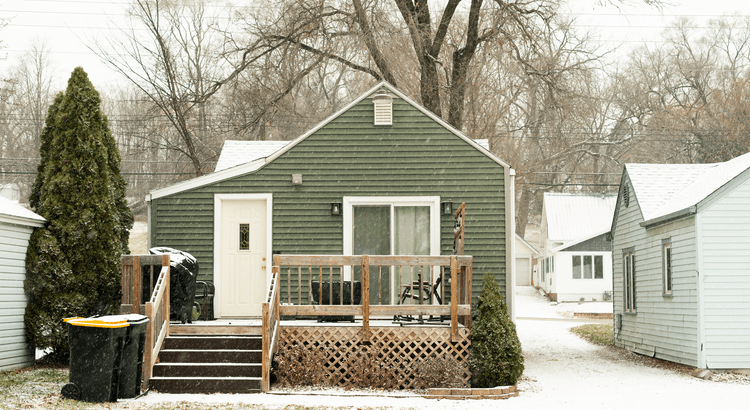The housing market is one of the most important aspects of the economy, and it is greatly affected by the recession. In this article, we will explore how the recession affects house prices and inventory levels, and buyer and seller attitudes. We will also look at how recessions can have a negative effect on homeowners and potential buyers. Finally, we will examine how real estate investors often benefit from recessions.
We’d like to preface this article by saying that we are not financial advisors, and you should always seek advice from a financial professional before making any financial decisions. Nonetheless, we look forward to providing some insight, and we hope you find value in this article! Thanks for reading!
Housing Prices
Negative growth in the economy has a direct impact on housing prices. The real estate market operates largely on the widely-known concept of supply and demand. Many people are reluctant to buy during recessions, and the number of potential buyers decreases, causing house prices to drop. Additionally, sellers who need to move quickly during housing market fluctuations may price their homes lower than normal to attract buyers. This creates an environment with an over-supply of homes, making it difficult for sellers to get the full value from their properties.
Buyer and Seller Attitudes
It is not uncommon for buyer and seller attitudes to change in the housing market during times of economic uncertainty. Potential buyers become more cautious about buying as they may worry about job security or their ability to repay a loan. Sellers may also be reluctant to put their properties on the market as they fear they will not be able to get enough money out of the sale. Additionally, sellers who list their properties may need to prepare themselves for longer selling periods, as there may not be many buyers in the market at any time.
Negative Consequences for Homeowners
One of the biggest negative effects of the recession on homeowners is their inability to get a loan from a bank. With tighter lending policies in place during an economic downturn as opposed to looser restrictions during periods of economic growth, banks become more selective about the customers they choose to lend money to. You need good credit, substantial savings, and a clean financial history. In addition, those who do receive loans may have to pay higher mortgage rates due to the higher risk associated with lending during a recession.
It’s been more than a decade since the housing market crash of 2008, but during that time and since, with the aid of extensive economic research, banks have learned how to lend properly. However, no system is perfect, and during a recession, you often find an influx of foreclosures. During times of prosperity, people take on more debt because they don’t fear losing their jobs and running out of money. They apply for larger home loans and spend more frivolously. Once the market starts to take a nose dive, people with home loans and mortgage rates that outweigh their debt-to-income ratio can’t keep up with their monthly mortgage payments, and they default on their loans.
Rising interest rates are also often caused by the Federal Reserve raising its benchmark for the rate at which banks loan and borrow money. This, in turn, raises the interest rates you’ll pay for your home loan. Fed hikes also raise your car loan interest rate, your grocery bill, and usually your gas, too. So, why does the Fed raise interest rates when it’s looking like the country is about to fall on hard times? Well, the nature of the economy is somewhat cyclical, meaning consumer prices peak and dip over time, and raising interest rates is one way the Fed tries to curb inflation and slow rising costs overall.
How Real Estate Investors Come Out on Top
Whenever there is a recession, real estate investors often benefit as they can buy up cheap homes while everyone else shies away from the real estate market and while real estate prices are low. This can be especially advantageous for investors who are willing and able to take risks and buy foreclosures or homes for sale by desperate sellers who are going through tough times. They often save on closing costs and can close quickly on many deals.
How Homeowners Can Stay Afloat During a Recession
Given the challenges posed by a recession, homeowners can take certain measures to ensure that they are in a better position to weather the storm. This includes staying on top of their finances and ensuring they have an emergency fund. Furthermore, they should be wise about home repairs, and upgrades as these can become expensive during recessions. Finally, it is important for homeowners to remain aware of their current market conditions so they can make sound decisions when it comes time to sell or buy a property.
If you’re unsure how to find all this information, check out a local real estate news portal like Real News through TheMLSonline. TheMLSonline – in addition to being a top resource for buyers and sellers to view listings – offers tons of great, updated articles for buyers and sellers to reference throughout their buying or selling journey.
Are You Prepared?
As we can see, recessions can have both positive and negative effects on the housing market, including home prices, buyer and seller attitudes, and more. It is important for buyers and sellers to understand these effects so that they can make informed decisions about real estate investments. Knowing how the recession affects home prices, inventory levels, and buyer and seller attitudes can help you make the most of this tumultuous time in the economy.








